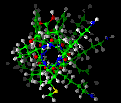 atomMovability
atomMovability atomMovability
atomMovability Jump to Description or
Examples; explanation of how
commands are documented.
Jump to Description or
Examples; explanation of how
commands are documented.
Operation Arguments Description
set type Set movability characteristic type for the name atom set specified by spec. The values of spec type and spec are associated with name for later reference. unset name Unset movability characteristic for the atom set associated with name or unset all movability characteristics if value of name is -all. When movability characteristic is unset, it reverts to the default value (movable).
Argument Operation Description
type set Legal values are movable, fixed, and excluded. Movable atoms participate fully in system motions and interactions. Fixed atoms exert forces on other atoms, but do not move. Excluded atoms have no effect on other atoms and do not move. name set/unset Arbitrary string selected by user. spec set General atom or subset spec.
 Jump to Syntax or
Examples
Jump to Syntax or
ExamplesAtom movability characteristics specified with the atomMovability command are applied in the order in which they are specified. Thus, an initial movability specification for an atom can be overridden by a subsequent command. Unsetting the subsequent specification restores the effect of the initial command.
The atomMovability command is actually a TCL procedure (defined in $BIOSYM/data/utility/atomMovability.tcl) that employs the set command to store the specification data into TCL associative arrays.
 Jump to Syntax or
Description
Jump to Syntax or
DescriptionThese examples show the differences between atom movability exclusion and energy calculation exclusion in calculations. If an atom is excluded using the atomMovability command, all energies (bond, angle, nonbond) involving that atom are excluded. These examples have been combined into an example exclusions.inp file, which you can run by saving it to a directory in which you have write permission and also copying the acenm.car and acenm.mdf files from the $BIOSYM/gifts/discover/tcl directory into the same directory. The exclusions.inp file contains echo statements to help make the examples clearer when the exclusions.inp file is run.
energy print energies = 1 database handle ener_h Energy. $ener_h select "Internal" Values.Name e1; $ener_h get int1 Values.Value $e1 $ener_h select "Bond" Values.Name e1; $ener_h get b1 Values.Value $e1 $ener_h select "Angle" Values.Name e1; $ener_h get a1 Values.Value $e1 $ener_h select "Nonbond" Values.Name e1; $ener_h get nb1 Values.Value $e1
atomMovability set excluded ex1 "ACENM:ACE_1:HA1" energy print energies = 1 database handle ener_h Energy. $ener_h select "Internal" Values.Name e1; $ener_h get int2 Values.Value $e1 $ener_h select "Bond" Values.Name e1; $ener_h get b2 Values.Value $e1 $ener_h select "Angle" Values.Name e1; $ener_h get a2 Values.Value $e1 $ener_h select "Nonbond" Values.Name e1; $ener_h get nb2 Values.Value $e1 atomMovability unset ex1If you run this example, note that both the nonbond and internal energies are different.
System_SetExcludeInternalEnergy "ACENM:ACE_1:HA1" energy print energies = 1 database handle ener_h Energy. $ener_h select "Internal" Values.Name e1; $ener_h get int3 Values.Value $e1 $ener_h select "Bond" Values.Name e1; $ener_h get b3 Values.Value $e1 $ener_h select "Angle" Values.Name e1; $ener_h get a3 Values.Value $e1 $ener_h select "Nonbond" Values.Name e1; $ener_h get nb3 Values.Value $e1 System_SetExcludeInternalEnergy "ACENM:ACE_1:HA1" IncludeIf you run this example, note that all the energies are the same as in Example 2.
System_SetExcludeInternalEnergy "ACENM:ACE_1:(CA,HA1)" energy print energies = 1 database handle ener_h Energy. $ener_h select "Internal" Values.Name e1; $ener_h get int4 Values.Value $e1 $ener_h select "Bond" Values.Name e1; $ener_h get b4 Values.Value $e1 $ener_h select "Angle" Values.Name e1; $ener_h get a4 Values.Value $e1 $ener_h select "Nonbond" Values.Name e1; $ener_h get nb4 Values.Value $e1 System_SetExcludeInternalEnergy "ACENM:ACE_1:(CA,HA1)" IncludeIf you run this example, note that the nonbond energy is unchanged but the internal energy is changed. Also note that the bond energy is now the same as that in Example 1.
 Main
access page
Main
access page  Advanced-Use access.
Advanced-Use access.
 List of BTCL commands
List of BTCL commands
 atomCoordinates command
atomCoordinates command
 begin command
begin command
Copyright Biosym/MSI